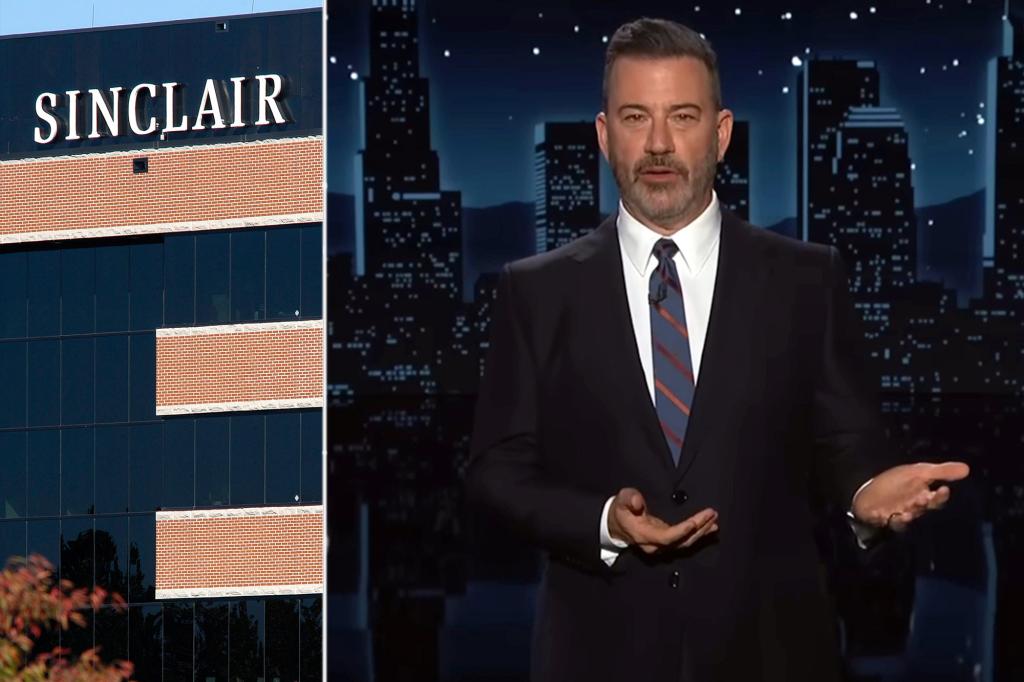Sinclair Broadcast Group’s Stand Against Jimmy Kimmel’s Return
In a bold move that has sent ripples through the broadcasting landscape, Sinclair Broadcast Group announced it would not air “Jimmy Kimmel Live!” on its ABC affiliate stations despite Disney’s decision to bring the late-night talk show back to screens. The announcement came just a day before Kimmel’s scheduled return on Tuesday, with Sinclair declaring on social media that they would be replacing his show with news programming across their extensive network of ABC affiliates. The media group, which controls the largest number of ABC affiliate stations in the country, indicated that discussions with ABC were ongoing and they were evaluating the possibility of the show’s return in the future. This standoff highlights the growing tensions between network decisions and affiliate stations, particularly when it comes to controversial content that may alienate portions of the viewing audience.
The controversy stems from Kimmel’s comments about Charlie Kirk, a conservative activist who was tragically killed. Kimmel had made remarks suggesting Kirk’s alleged killer was part of the “MAGA gang,” comments that were widely criticized as both factually incorrect and insensitive given the circumstances of Kirk’s death. Disney initially suspended Kimmel’s show last Wednesday, explaining in a Monday statement that the decision was made “to avoid further inflaming a tense situation at an emotional moment for our country,” and acknowledging that some of Kimmel’s comments were “ill-timed and thus insensitive.” The suspension, however, was short-lived, as Kimmel reportedly negotiated his return directly with Walt Disney Co. CEO Bob Iger and Disney Entertainment Co-Chair Dana Walden. Sources close to the situation revealed that while Kimmel plans to address his controversial comments during his return broadcast, he will not offer a full apology for his remarks about Kirk.
Sinclair Broadcast Group had taken a firm stance on the matter even before announcing their decision to preempt the show. The company had called for Kimmel to issue a “direct apology” to the Kirk family and make a donation to Turning Point USA, the conservative nonprofit that Kirk co-founded. Jason Smith, Sinclair’s Vice Chairman, had stated unequivocally that “Mr. Kimmel’s remarks were inappropriate and deeply insensitive at a critical moment for our country.” This position reflects Sinclair’s apparent dissatisfaction with how the situation was handled by both Kimmel and Disney, suggesting that the media group feels the response has been inadequate given the gravity of the comments made. The standoff represents a rare instance where an affiliate group has taken such a decisive stand against network programming decisions, particularly involving a show as high-profile as Kimmel’s.
The implications of Sinclair’s decision extend beyond just one late-night talk show, as it raises questions about whether other major affiliate groups might follow suit. Nexstar, which operates 32 ABC affiliates, has not yet indicated whether it will also preempt “Jimmy Kimmel Live!” If Nexstar were to join Sinclair in this action, the impact would be substantial – together, these two affiliate groups represent approximately a quarter of ABC’s reach to American households. This potential loss of viewership would not only affect ratings but could also impact advertising revenue for the show and the network. Additionally, Sinclair’s ownership of WJLA-TV, an influential flagship station in Washington DC, means that viewers in the nation’s capital – including many political figures and policy makers – would not have access to Kimmel’s show through traditional broadcast channels.
Kimmel, who reportedly earns $15 million per year as one of the longest-running late-night hosts currently on television, now finds himself at the center of a complex situation that highlights the challenges of navigating political commentary in today’s polarized media landscape. The controversy also underscores the power dynamics between networks and their affiliate stations, which traditionally have limited input on programming decisions but maintain the ability to preempt network shows in exceptional circumstances. This situation may set a precedent for how similar controversies are handled in the future, particularly as political divisions in the country continue to deepen and media figures find themselves increasingly scrutinized for their comments on sensitive political matters.
As viewers and industry observers await further developments, the standoff between Sinclair and ABC over “Jimmy Kimmel Live!” serves as a reminder of the complex relationship between free speech, corporate interests, and public sensitivity. While networks and talent have traditionally enjoyed significant latitude in commentary and satire, there appears to be a growing recognition that certain boundaries exist, particularly when it comes to tragic events. Whether this incident represents a temporary disagreement or signals a more fundamental shift in the relationship between networks and their affiliates remains to be seen. What is clear, however, is that in an era of fragmented media consumption and heightened political sensitivity, even established shows and personalities are not immune to consequences when their commentary crosses certain lines in the eyes of media gatekeepers and segments of the viewing public.








